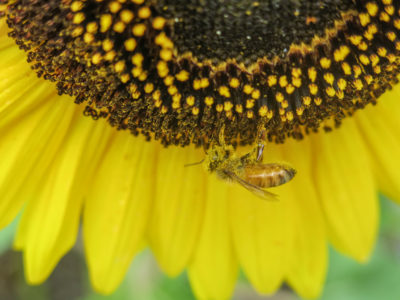
FIT has two beehives. More importantly, however, the bees are happy.
This past April, on Earth Day, FIT students ― along with Suzanne McGillicuddy, assistant dean of students and co-chair, FIT’s Sustainability Council ― installed two beehives on the green roof between the Goodman and Pomerantz buildings.
The goal of the Hives project, as it is formally called, is to foster education across numerous disciplines about bees and their role in the environment, to educate FIT students about the importance of bees and the fields FIT serves, and to contribute to the city’s bee population. Students will spearhead the education component, while the beekeeping and maintenance of the hives is being handled by the New York-based Honeybee Conservancy.




Three months in, the number of bees has increased significantly, which means they are thriving in their new home. Honey is already being produced, which usually takes a new hive approximately a year, McGillicuddy said. Part of the reason they are doing so well is that there is a lot of plant life in the vicinity. In addition to FIT’s green roofs and dye garden, there is the High Line and Madison Square Park, among other areas, to sustain the two hives, but the way the bees are flourishing so early on is a pleasant surprise to all involved.
Visual Presentation and Exhibition Design student Shona Neary and alumna Sarah Langenbach, a graduate of the Cosmetics and Fragrance Marketing program, initiated the project, which was funded by FIT’s Think Big Challenge ― a call to students who have an interest in changing the world and tackling real-world problems in innovative ways. Max Hechtman, Film and Media, screened his documentary FIT Hives: Sustainability—The Secret to Survival at the 2017 Gold Reel Student Film Festival on the University of North Carolina–Charlotte campus. His film, funded by an FIT Innovation Grant, documents the genesis of the project.
